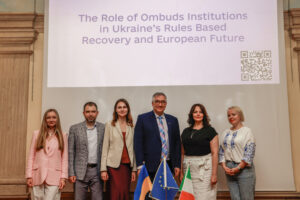Difensori civici italiani protagonisti del dialogo sui diritti e sulla ricostruzione democratica dell’Ucraina.
Date of article: 10/07/2025
Daily News of: 11/07/2025
Country:  Italy
Italy
Author: National Coordination of Ombudsmen of Italy
Article language: it
Doppio appuntamento a Roma per il Coordinamento Nazionale dei Difensori Civici: Senato della Repubblica e Ukraine Recovery Conference: 9 luglio 2025.
Una giornata intensa, ricca di contenuti e visioni condivise sul futuro dei diritti, della legalità e della ricostruzione democratica. I Difensori civici italiani sono stati protagonisti di due rilevanti appuntamenti istituzionali a Roma, che hanno visto la partecipazione di rappresentanti italiani, ucraini ed europei.
Nel pomeriggio si è tenuto presso il Senato della Repubblica – Palazzo Cenci – l’incontro “Difesa civica e diritti fondamentali: un ponte tra cittadini e democrazia”, promosso dalla Senatrice Cinzia Pellegrino, componente della Commissione Diritti Umani. Un confronto ad alto livello che ha messo al centro il ruolo della difesa civica nel garantire giustizia e protezione, soprattutto in contesti di crisi ed emergenza.
Durante il suo intervento, Marino Fardelli, Difensore civico della Regione Lazio e Presidente del Coordinamento Nazionale dei Difensori Civici, ha dichiarato:
“La difesa civica è il ponte tra le persone e le istituzioni, soprattutto quando i diritti rischiano di essere messi in secondo piano.”
Tre parole chiave hanno ispirato l’incontro:
- Ricostruzione democratica, con particolare attenzione all’Ucraina e alla resilienza delle sue istituzioni;
- Protezione delle persone vulnerabili, in particolare minori, donne, anziani e sfollati;
- Emergenze e diritti, con la ferma convinzione che anche nei momenti più critici i diritti debbano essere tutelati e non sospesi.
Il Presidente Fardelli ha inoltre rivolto un sentito ringraziamento alla Senatrice Pellegrino per la sensibilità istituzionale e l’impegno dimostrato, sottolineando il valore di una politica che ascolta, protegge e costruisce.
Nella stessa mattinata, sempre a Roma presso il Centro Congressi Via Cavour,, si è svolta la tavola rotonda “I guardiani dell’equità”, promossa dal Business Ombudsman Council dell’Ucraina, nell’ambito della Ukraine Recovery Conference (URC2025).
Al dibattito hanno preso parte:
- Marino Fardelli, Presidente del Coordinamento Nazionale dei Difensori Civici;
- Guido Giusti, Difensore civico dell’Emilia-Romagna e Vicepresidente del Coordinamento;
- Marco Enrico, Difensore civico della Sardegna;
insieme a: - Roman Waschuk, Business Ombudsman d’Ucraina;
- Tetiana Korotka, Deputy Business Ombudsman dell’Ucraina;
- Nicolas Pinaud, Deputy Director dell’OSCE Directorate for Financial and Enterprise Affairs.
- Zoran Pasalic, Ombudsman della Serbia
- Sinisa Bjekovic, Ombudsman del Montenegro
Nel suo intervento, Fardelli ha ribadito:
“Non può esserci vera ricostruzione senza giustizia e trasparenza. L’Italia è pronta a sostenere l’Ucraina con l’esperienza e la forza dei suoi presìdi democratici.”
Roman Waschuk ha sottolineato:
“La gente viene da noi per chiedere che vengano rispettate le regole. È nostro compito assicurarci che le regole siano la guida della ricostruzione.”
Guido Giusti ha evidenziato l’importanza della cooperazione tra ombudsman a livello europeo per rafforzare fiducia e legalità, mentre Marco Enrico ha rimarcato il ruolo attivo delle Regioni italiane, sempre più vicine ai bisogni concreti dei cittadini, anche in un’ottica di scambio internazionale e cooperazione interistituzionale.
Due eventi, una missione comune: costruire ponti di dialogo, trasparenza e fiducia tra istituzioni e cittadini, in Italia, in Europa e accanto all’Ucraina, nel suo percorso verso una piena ricostruzione democratica e una solida integrazione europea.
Il Difensore civico “ponte” e garante nella ricostruzione








